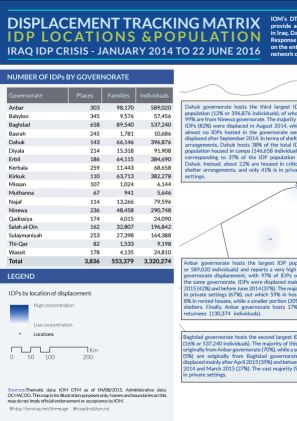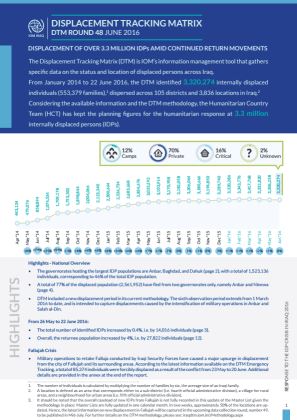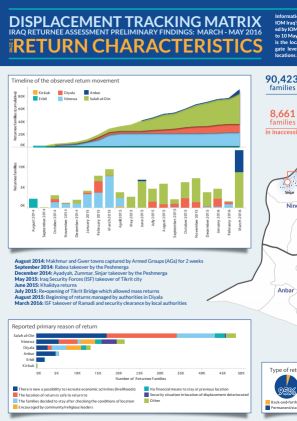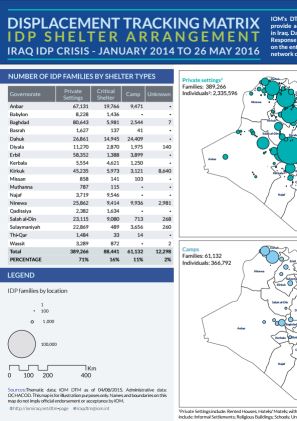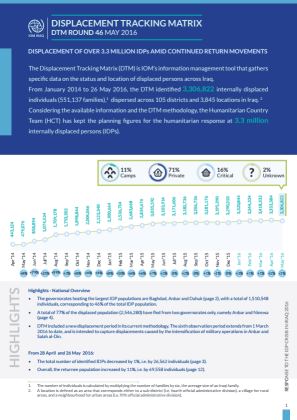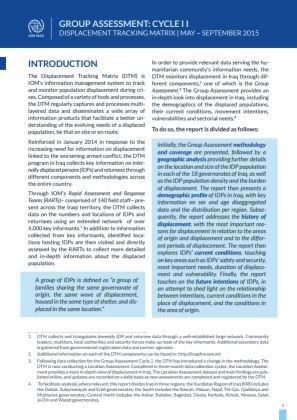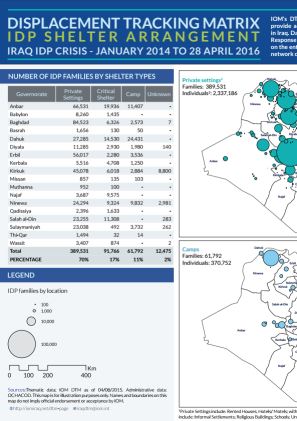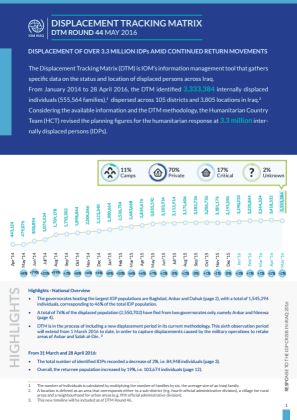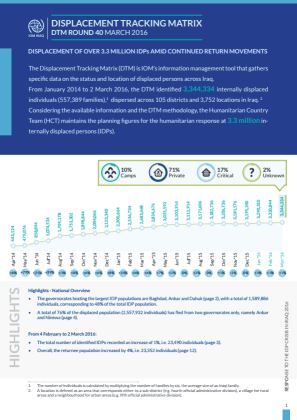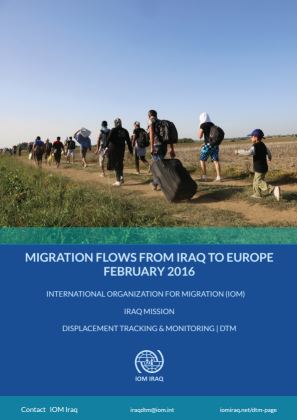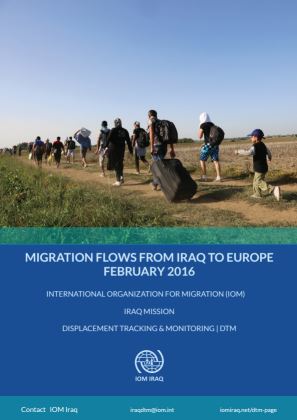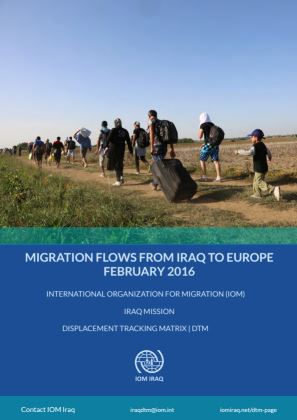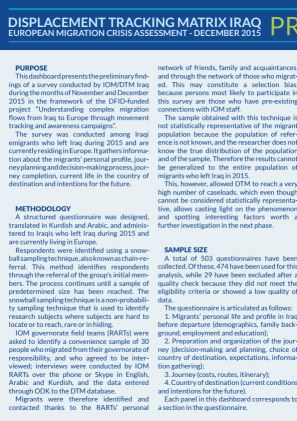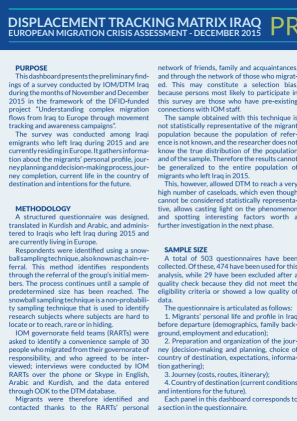-
Countries
-
Data and Analysis
-
Special Focus
-
Crisis Responses
Iraq
Desplazados internos rastreados
Movimientos de desplazamiento
1,124,000
IDMC 2023
Ronda de recopilación de datos
Sobre Iraq
Reinforced in January 2014 in response to the need for information on displacement linked to the worsening armed conflict, the DTM programme in Iraq collects key information on internally displaced persons (IDPs) and returnees through different components and methodologies across the entire country.
Through IOM's Rapid Assessment and Response Teams (RARTs) -composed of 140 field staff- present throughout the Iraqi territory, the DTM collects data on numbers and locations of IDPs and returnees using an extended network of over 4,000 key informants. In addition to information collected from key informants, identified locations hosting IDPs are then visited and directly assessed by the RARTs to collect more detailed and in-depth information on the displaced population.
Please visit the Access to Durable Solutions among IDPs in Iraq
Para obtener resultados de búsqueda más avanzados, vaya a la Página de búsqueda avanzada de informes
Iraq — IDP Locations and Populations (June 2016)
From the start of January 2014 through 22 June 2016, the DTM has identified 3,320,274 internally displaced individuals (553,379 families). This map shows locations where IDPs are currently residing, as well as overall concentrations across the country.
Jun 22 2016
Iraq — IDP Locations and Populations (June 2016)
Iraq — Displacement Report 48 (June 2016)
From January 2014 to 22 June 2016, the DTM identified 3,320,274 IDPs (553,379 families), dispersed across 105 districts and 3,836 locations in Iraq.
Jun 22 2016
Iraq — Displacement Report 48 (June 2016)
Iraq — Return Assessment (March — May 2016)
Information presented in this dashboard comes from the IOM Iraq’s DTM Returnee Location Assessment, conducted by IOM’s field teams across the country from 25 March to 10 May 2016. 95% of returns are permanent or stationary (as opposed to “back and forth”). 87% of returnees intend to remain.
Jun 13 2016
Iraq — Return Assessment (March — May 2016)
Iraq — IDP Shelter Arrangement (May 2016)
From the start of January 2014 through 26 May 2016, the DTM identified 3,306,822 internally displaced individuals (551,137 families). This maps shows the sizes of IDP population residing in 3 main shelter categories (private, critical, camp plus unknown).
May 26 2016
Iraq — IDP Shelter Arrangement (May 2016)
Iraq — IDP Locations and Populations (May 2016)
From the start of January 2014 through 26 May 2016, the DTM has identified 3,306,822 internally displaced individuals (551,137 families). This map shows locations where IDPs are currently residing, as well as overall concentrations across the country.
May 26 2016
Iraq — IDP Locations and Populations (May 2016)
Iraq — Displacement Report 46 (May 2016)
From January 2014 to 26 May 2016, the DTM identified 3,306,822 internally displaced individuals (551,137 families), dispersed across 105 districts and 3,845 locations in Iraq.
May 26 2016
Iraq — Displacement Report 46 (May 2016)
Iraq — Group Assessment: Cycle 2 (May — September 2015)
For Group Assessment Cycle 2, a total of 3,037 locations were assessed throughout 18 governorates in Iraq between May and September 2015. This corresponds to 84% of the 3,615 locations identified by the DTM during the reporting period.
Iraq — IDP Shelter Arrangement (April 2016)
From the start of January 2014 through 28 April 2016, the DTM identified 3,333,384 IDPs (561,542 families). This maps shows the sizes of IDP population residing in three main shelter categories (private, critical, camp plus unknown).
Apr 28 2016
Iraq — IDP Shelter Arrangement (April 2016)
Iraq — Displacement Report 44 (May 2016)
From January 2014 to 28 April 2016, the DTM identified 3,333,384 IDPs (555,564 families), dispersed across 105 districts and 3,805 locations in Iraq.
Apr 28 2016
Iraq — Displacement Report 44 (May 2016)
Iraq — IDP Locations and Populations (April 2016)
From the start of January 2014 through 28 April 2016, the DTM has identified 3,333,384 internally displaced individuals (555,564 families). This map shows locations where IDPs are currently residing, as well as overall concentrations across the country.
Iraq — Displacement Report 42 (April 2016)
From January 2014 to 31 March 2016, the DTM identified 3,418,332 IDPs (569,722 families), dispersed across 105 districts and 3,785 locations in Iraq.
Mar 31 2016
Iraq — Displacement Report 42 (April 2016)
Iraq — Displacement Report 40 (March 2016)
The governorates hosting the largest IDP populations are Baghdad, Anbar and Dahuk (page 2), with a total of 1,589,886 individuals, corresponding to 48% of the total IDP population. A total of 76% of the displaced population (2,557,932 individuals) has fled from two governorates only, namely
Mar 30 2016
Iraq — Displacement Report 40 (March 2016)
Iraq — Migration from Iraq to Europe (February 2016)
This report presents the findings of a survey conducted by IOM Iraq during the months of November and December 2015, in the framework of the DFID-funded project “Understanding complex migration flows from Iraq to Europe through movement tracking and awareness campaigns”.
Iraq — Migration from Iraq to Europe (February 2016)
This report presents the findings of a survey conducted by IOM Iraq during the months of November and December 2015, in the framework of the DFID-funded project “Understanding complex migration flows from Iraq to Europe through movement tracking and awareness campaigns”.
Iraq — Migration Flows from Iraq to Europe (February 2016)
This study is the result of interviews with 473 individuals (November–December 2015) migrating from Iraq to Europe. One of the report’s key findings is the lack of clear-cut, homogeneous and predictable answers, once more highlighting the complexity of migration.
Iraq — European Migration Crisis Assessment (December 2015)
This dashboard presents the preliminary findings of a survey conducted by IOM/DTM Iraq during the months of November and December 2015 in the framework of the DFID-funded project “Understanding complex migration flows from Iraq to Europe through movement tracking and awareness campaigns”.
Iraq — IDP Shelter Arrangement (February 2016)
From the start of January 2014 through 4 February 2016, the DTM identified 3,320,844 internally displaced individuals (553,474 families). This maps shows the sizes of IDP population residing in 3 main shelter categories (private, critical, camp plus unknown).
Feb 04 2016
Iraq — IDP Shelter Arrangement (February 2016)
Iraq — IDP Locations and Populations (February 2016)
From the start of January 2014 through 04 February 2016, the DTM identified 3,320,844 internally displaced individuals (553,474 families). This maps shows the sizes of IDP population residing in 3 main shelter categories (private, critical, camp plus unknown).
Iraq — Displacement Report 38 (February 2016)
From January 2014 to 4 February 2016, the DTM identified 3,320,844 IDPs (553,474 families), dispersed across 105 districts and 3,698 locations in Iraq.
Feb 04 2016
Iraq — Displacement Report 38 (February 2016)
Iraq — Understanding complex migration flows from Iraq to Europe (November — December 2015)
This dashboard presents the preliminary findings of a survey conducted by IOM/DTM Iraq during the months of November and December 2015 in the framework of the DFID-funded project “Understanding complex migration flows from Iraq to Europe through movement tracking and awareness campaigns”.
Iraq — IDP Shelter Arrangement (January 2016)
From the start of January 2014 through 07 January 2016, the DTM identified 3,290,310 internally displaced individuals (548,385 families). This maps shows the sizes of IDP population residing in 3 main shelter categories (private, critical, camp plus unknown).
Jan 07 2016
Iraq — IDP Shelter Arrangement (January 2016)
Iraq — IDP Locations and Populations (January 2016)
From the start of January 2014 through 07 January 2016, the DTM has identified 3,290,310 internally displaced individuals (548,385 families). This map shows locations where IDPs are currently residing, as well as overall concentrations across the country.
Iraq — Displacement Report 36 (January 2016)
From January 2014 to 7 January 2016, the DTM identified 3,290,310 internally displaced individuals (548,385 families), dispersed across 105 districts and 3,663 locations in Iraq.
Jan 07 2016
Iraq — Displacement Report 36 (January 2016)
Iraq — Migration from Iraq to Europe (December 2015)
This dashboard presents the preliminary findings of a survey conducted by IOM/DTM Iraq during the months of November and December 2015 in the framework of the DFID-funded project “Understanding complex migration flows from Iraq to Europe through movement tracking and awareness campaigns”.
Pagination
Para obtener resultados de búsqueda más avanzados, vaya a la Página de búsqueda avanzada de conjuntos de datos
Pagination
- First page
- Previous page
- …
- 5
- 6
- 7
- 8
- 9
- 10
- 11
- 12
- 13


